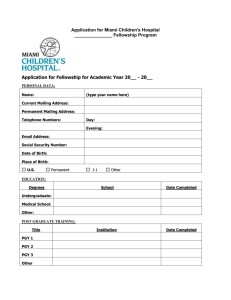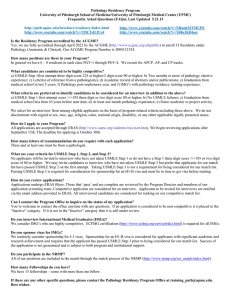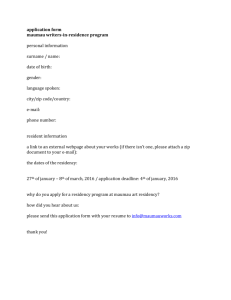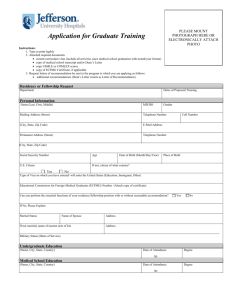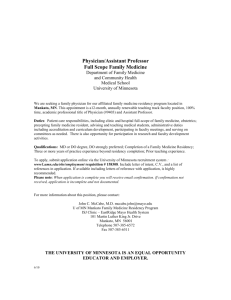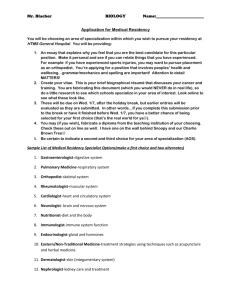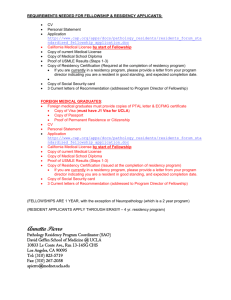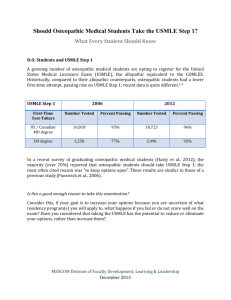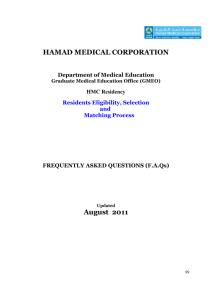Dr. Shen shared his PPT presentation here for more information.
advertisement
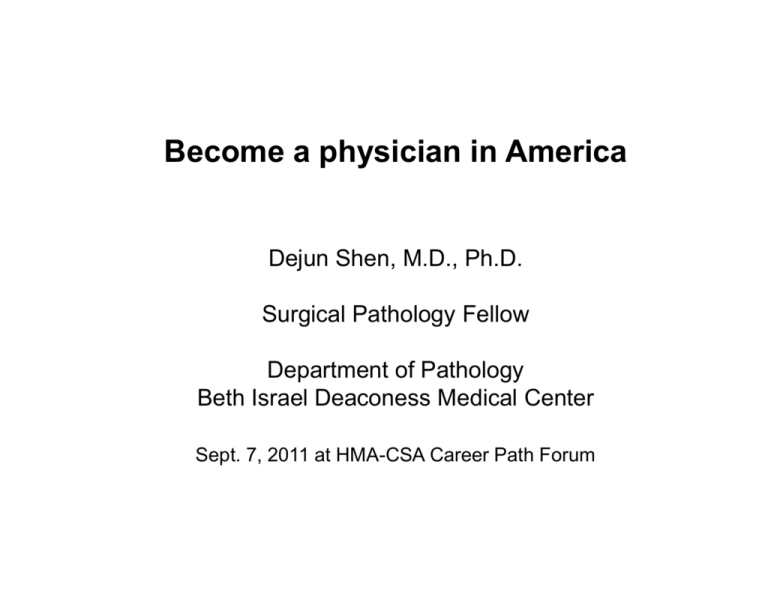
Become a physician in America Dejun Shen, M.D., Ph.D. Surgical Pathology Fellow Department of Pathology Beth Israel Deaconess Medical Center Sept. 7, 2011 at HMA-CSA Career Path Forum Requirements for Becoming a Physician in US Undergraduate education Medical School Residency Fellowship Brain storms 1. Why do I want to become a doctor in US? • I am clinician in China and like to work with patient… • Save lives so more rewarded and respected as a career … • Job security and better income… 2. Common Excuses: • I studied medicine in China and my English is not good enough… • I am away from clinics too long and it is difficult to get into a residency program anyway… • I am foreigner and it will be difficult to survive through a residency training… Source: Congressional Research Service (CRS) analysis of Remuneration of Health Professions, OECD Health Data 2006 (October 2006), available at [http://www.ecosante.fr/OCDEENG/70.html]. Physician Compensation Specialty Salary Anesthesiology Gynecology & Obstetrics Family Medicine General Surgery Internal Medicine Pediatrics & Adolescent Plastic & Reconstruction Family Medicine Emergency Care Neurological Surgery Average Starting $275,000 $200,000 $130,000 $220,000 $135,000 $125,000 $250,000 $130,000 $178,000 $400,000 2007 Physician Compensation Survey, By the American Medical Group Association (AMGA) Medscape Physician Compensation Report 2011 Physicians are in demand… • Employment of physicians and surgeons is projected to grow 14 percent from 2006 to 2016, for all occupations • The average of all jobs is an increase of 7 to 13 percent • There will be a shortage of 200,000 physicians by 2020 • The highest increases in specialty will be in Hospitalist; Pediatrics; OB/GYN; HEM/ONC; Family Practice Bureau of Labor Statistics “Physicians and Surgeons” (2008) Merritt Hawkins and Associates “2007 Review of Physician and CRNA Recruiting Incentives” (2007) Journal of Academic Medicine “Factors Associated With Medical Students' Career Choices Regarding Internal Medicine” (2008) Requirements for residency application 1. Tests (http://www.usmle.org): • USMLE step 1 • Step 2CK= clinical knowledge • Step 2CS= clinical skills • Step 3=license test 2. Others: • ACGME certificate (http://www.acgme.org) • Postgraduate Training Authorization Letter=PTAL, also called California letter (http://www.mbc.ca.gov/applicant/additional_info.html ) 3. The National Resident Matching Program (NRMP) and the Electronic Residency Application Service (ERAS) USMLE Step 1 • Subjects – Anatomy, Physiology, Biochemistry, Pharmacology, Behavioral sciences, Pathology, Microbiology. • Exam format – Computer based exam: MCQs – Total exam time: 1 day exam=8hrs USMLE Step 2 CK (Clinical Knowledge) • Subjects – Medicine, Surgery, Gynecology and Obstetrics, Pediatrics, Psychiatry • Exam format – Computer based exam: MCQs – Total exam time: 1 day exam=9hrs USMLE Step 2 CS (Clinical Skills) • Subjects tested: Same as step 2 CK • Test centers – Philadelphia, PA. Houston, TX. Chicago, IL. Atlanta, GA. Los Angeles, CA. • Exam Format – – – – Involves direct patient encounters Total exam time: 8H (1 day exam) Total no of stations: 12 Time available at each station • 25 min, you are required to take history, do physical examination, determine differential diagnosis and then write down notes of 12 Simulated patients (SPs) USMLE Step 3 • Subjects – Same to Step 2 CK • Total exam time: 2 day exam • For licensing purpose, not required for residency application Test preparations 1. First Aid for USMLE step 1, 2, 3 2. Kaplan (http://www.kaptest.com/Medical-Licensing/index.html) 3. USMLE world (http://www.usmleworld.com/) 4. http://www.usmle.net/ Residency application 1. Study for the programs: FREIDA search: (https://freida.ama-assn.org/Freida/user/viewProgramSearch.do) 2. Preparations for residency application: • Personal statement • Recommendation letters >= 3 • Clerkship/observership • Research • Friends… 3. Resident interview: it is the key! 4. Residency match (through ERAS) and post match Survive through the residency • 1st year: work hard, read a lot and well prepared for any presentations • 2nd year: think about the future and start to prepare for it • 3rd year and beyond: fellowship application • Fellowship year: job application Protection to house staff Limits imposed on resident work hours by ACGME Accreditation Council for Graduate Medical Education • Resident can work no more than 80 hours a week • No more than 24 consecutive hours as part of a single shift • No more than every third night on call Find a dreaming job 1. Consult your seniors and attendings 2. Prepare cover letter and CV 3. Get excellent REFERENCES!!! 4. Interview • Presentation • Meeting with faculties 5. Negotiation and make your decision Thank you very much!
